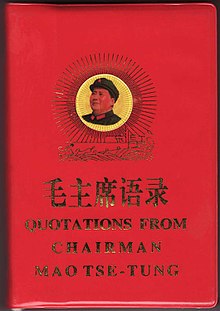The Little Red Book

1966 bilingual edition, published by the People's Republic of China Printing Office
|
|
| Editor | People's Liberation Army Daily |
|---|---|
| Author |
Mao Zedong (Mao Tse-tung) Hou Bo (photographer) |
| Original title | 毛主席语录 Máo Zhǔxí Yǔlù |
| Translator | Central Compilation and Translation Bureau |
| Country | People's Republic of China |
| Language | Chinese |
| Publisher |
People's Liberation Army General Political Department (initial releases) People's Press (officially and massively since 1965) |
|
Publication date
|
January 1964 |
| Media type | Print (Hardback & Paperback) |
| ISBN | |
| OCLC | 23380824 |
| Text | at |
Quotations from Chairman Mao Tse-tung (simplified Chinese: 毛主席语录; traditional Chinese: 毛主席語錄; pinyin: Máo Zhǔxí Yǔlù) is a book of statements from speeches and writings by Mao Zedong (Mao Tse-tung), the former Chairman of the Communist Party of China, published from 1964 to about 1976 and widely distributed during the Cultural Revolution.
The most popular versions were printed in small sizes that could be easily carried and were bound in bright red covers, becoming commonly known in the West as the Little Red Book.
Quotations from Chairman Mao Tse-tung was originally compiled by an office of the PLA Daily (People's Liberation Army Daily) as an inspirational political and military document. The initial publication covered 23 topics with 200 selected quotations by the Chairman of the Chinese Communist Party, and was entitled 200 Quotations from Chairman Mao. It was first given to delegates of a conference on 5 January 1964 who were asked to comment on it. In response to the views of the deputies and compilers of the book, the work was expanded to address 25 topics with 267 quotations, and the title was changed simply to Quotations from Chairman Mao Tse-Tung.
On 10 January, the work was re-issued to the delegates and sent to select units of the People's Liberation Army who received their advance copies for educating troops as well as for their comments. In May 1964, the PLA General Political Department, the chief political organ under Central Military Commission, revised Quotations, adding a half title page with the slogan "Workers of the world, unite!" (全世界的无产阶级,联合起来!) in bold red letters, and endorsement leaves written by Lin Biao, Mao's chosen successor, that included three lines from the diary of revolutionary hero Lei Feng. This version was issued "for internal use" to the military leaders. Following discussions that expanded the book twice more—finally closing on 33 topics and 427 quotations by Mao—the commission began publishing the definitive version in May 1965.
...
Wikipedia
